剑桥国际英语教程unit 7
剑桥国际少儿英语二级unit7课文内容

Unit 7 At the farmP40-1 CD2-11Suzy:Look at those animals.this is a nice zoo.Mr:it isn’t a zoo.it’s a farm.Look,there is a cow under the tree.Simon:Oooo,Mum,the goat’s eating the new bag.Mrs:A,shooo.stop that .Stella:Look,Suzy,the baby sheep is drinking milk.Suzy:OoooooMr:Let’s give the duck some bread.Suzy: En, there is a frog.Simon:Look ,stella ,there is a lizard on your T-shirt.Stella:Ha-Ha Simon, very funny.I know.and I love lizard . Do you like spider ,Simon? Simon:No,I don’t .Stella:Well, there is a big black and ugly spider on your head.Simon:AAAAAP40-2 CD2-12cow duck goat lizard sheep spider frogP41-3 CD2-13 歌谣,书本上有字母不用打。
CD2-14伴奏P42-5 CD2-15Marie:Trevor,Can I have the sheep, please!Let’s put it here next to the cows. Trevor:Here you are !Monty:Wa I love sheep. Ba ba baTrevor:So do I .Maskman:I don’t .I love horses.Marie:Oh ,So do I.Trevor:I don’t .Horses are very big and they can kick.Maskman:What know?Monty:Let’s put the goat under the tree.Marie:No,Monty, it can eat the flowers. I love flowers.Maskman: So do I .Trevor:Flowers,Maskman?Do you love flowers ?Maskman:Yes,I do.I can give it to Marie.P42-6 CD2-16I love sheep .So do I.I love horses. I don’tP43 7.8 CD2-17.18I love Bla bla ,So do I P44---9,10 CD2-19.20 P45--11 CD2-21小故事书上有,不用打。
剑桥国际少儿英语KB1 Unit7单元文本

剑桥国际少儿英语1第七单元文本Unit 7 Wild animalsSuzy: Ok, Simon.Simon: What’s this animal? It’s a big cat. It’s orange and black.Suzy: That’s easy. It’s a tiger.Simon: Yes. Very good. What now? This animal is big and grey.Suzy: It’s a hippo.Simon: No, it’s big and grey with a long nose.Suzy: It’s an elephant.Simon: Ok, ok. What’s brown and yellow with a small head?Suzy: Is it a monkey?Simon: No, it isn’t.Suzy: I know! It’s a giraffe.Simon: Yes, ve ry good. Ok. What’s this? It’s long and green and …Suzy: Er, is it a snake?Simon: Hah! No, it isn’t. This animal is big, long, green and …Suzy: I know! I know! It’s a crocodile.Simon: Yup!Suzy: Now, it’s my turn. What’s this? It’s small and white wit h red hair and a big mouth.Simon: Er, I don’t know. What animal is that, Suzy?Suzy: It’s a Simon! Ha! Ha! Ha!Simon: Very funny, Suzy. Thank you.Giraffe and crocodile.Tiger, elephant, hippo, snake,Giraffe and crocodile.Listen and look.Point to the animal in this book.It’s small and brown.It’s long and gre en.It’s grey and dirty.It’s big and clean.It’s orange and black.It’s red and blue.It’s yellow and brown with a small head too.Come alive.Walk and talk.On the count of five.One, two, three, four, five.Maskman: What have you got there, Trevor?Trevor: I’ve got a book on animals. Look at these monkeys. They are funny. Maskman: Yes, they’ve got long arms and big hands. Oooh. What are they? Trevor: They are crocodiles. They are long and green and they’ve got b ig mouths and long tails.Monty: How many teeth have they got?Trevor: They’ve got a lot of teeth.Maskman: Have they got long legs?Trevor: No, they haven’t. They’ve got short legs and feet.Look at the snakes. They’ve got no legs and no feet.Maskman: Look at the elephants. They are big and grey.They’ve got very big ears, long noses and short tails.Monty: Hmmm. Elephants. They’re my favorite animals.They’ve got short legs.They’ve got long legs.They haven’t got feet.Animals, animals, short and tall.Animals, animals, dirty and clean.Animals, animals, brown and green.Come on children, sing along.Sing and move to the animal song.Le t’s all do the hippo show.Let’s all do the hippo showLet’s all do the hippo showMove your hands and feet.Let’s all do the elephant dance.Let’s all do the elephant dance.Move your arms and legs.Let’s all do the snake shake.Move your head and tail.L et’s all do the crocodile smile.Let’s all do the crocodile smile.Let’s all do the crocodile smile.Show your big white teeth.Let’s all do the giraffe laugh.Let’s all do the giraffe laugh.Let’s all do the giraffe laugh.Open your big clean mouth.Car, computer, crocodile, catCar, computer, crocodile, catCome alive.Walk and talk.On the count of five.One, two, three, four, five.Monty: Animals, animals, big and small. Animals, animals, short and tall. Marie: Help! Help, Maskman! Look at these snakes. They’re long and ugly and they’ve got two long teeth.Maskman: I’m here, Maree. I’ve got the snakes. Snakes have got two long teeth, but I’ve got two big arms.Marie: Ooohh, Maskman, thank you. You are a superhero.Trevor: Help! Help! Help, Maskman! Look at these crocodiles. They’ve got big mouths and they’ve got a lot of teeth.Maskman: I’ m here, Trevor. I’ve got the crocodiles. Crocodiles have got big mo uths and a lot of teeth, but I’ve got long legs and big hands. Trevor: Ooohh, Maskman, thank you. You are a superhero.Maskman: Help! Help! Look at these elephants. They are very big. And they’ve got very big feet. Aaaagghh!Monty: I’m here, Maskman! Elephants are very big and they’ve got very big feet, but I’m a mouse, I’m very small.Maskman, Trevor, Marie: Thank you,Monty. You are a small mouse, but you are a superhero.。
剑桥国际少儿英语Unit7

button
umbrella
gloves
belt
tights
shorts
handbag
Buttons hold clothes together and decorate them. Today buttons are made of plastic, metal. glass and shells, but the ancient Greeks had buttons made of gold.
Your grandfather probably wore shorts at school when he was 14! These we usually wear them for sport and when it’s hot.
People usually wear gloves on their hands when it’s cold, but some people use gloves at work, for example firefighters.
Men and women have worn belts for about 5,000 years. People first used them to carry thing and, much later, to hold their trousers up.
The first pockets were small bags which people wore on their belts. Thieves could take them easily so people put the bags inside their clothes. Then it was difficult to get money from out, so in the 18th Century people sewed pockets into their The first pockets were small ________. bags 5.Older boys wore _______ to shorts school 60 years ago. Tights 6._______ are usually made of nylon or wool.
剑桥国际少儿英语第二版第七单元逐课讲解
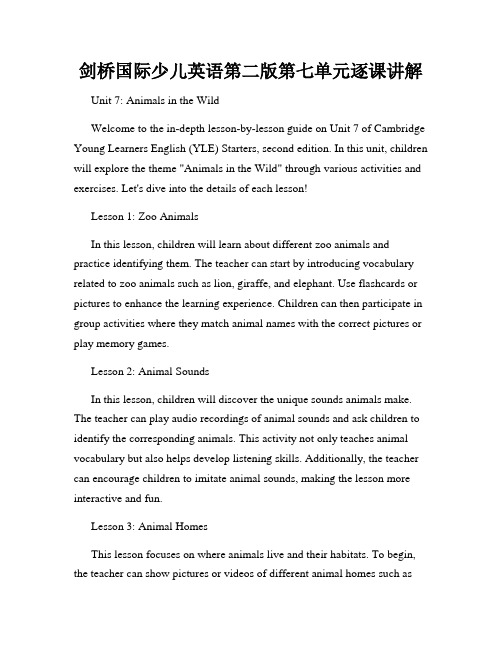
剑桥国际少儿英语第二版第七单元逐课讲解Unit 7: Animals in the WildWelcome to the in-depth lesson-by-lesson guide on Unit 7 of Cambridge Young Learners English (YLE) Starters, second edition. In this unit, children will explore the theme "Animals in the Wild" through various activities and exercises. Let's dive into the details of each lesson!Lesson 1: Zoo AnimalsIn this lesson, children will learn about different zoo animals and practice identifying them. The teacher can start by introducing vocabulary related to zoo animals such as lion, giraffe, and elephant. Use flashcards or pictures to enhance the learning experience. Children can then participate in group activities where they match animal names with the correct pictures or play memory games.Lesson 2: Animal SoundsIn this lesson, children will discover the unique sounds animals make. The teacher can play audio recordings of animal sounds and ask children to identify the corresponding animals. This activity not only teaches animal vocabulary but also helps develop listening skills. Additionally, the teacher can encourage children to imitate animal sounds, making the lesson more interactive and fun.Lesson 3: Animal HomesThis lesson focuses on where animals live and their habitats. To begin, the teacher can show pictures or videos of different animal homes such asnests, burrows, and caves. Children can work in pairs or small groups to match animals with their appropriate habitats. This activity promotes critical thinking and encourages children to learn about animals in their natural environments.Lesson 4: Animal Body PartsIn this lesson, children will learn about the different body parts of animals. The teacher can use visual aids to introduce vocabulary related to animal body parts, such as wings, fins, and tails. Children can then participate in interactive activities, like labeling animal diagrams or playing "Simon Says" to mimic animal movements. These activities not only teach vocabulary but also promote physical coordination.Lesson 5: Animal ActionsThis lesson focuses on the actions animals perform. The teacher can use pictures or videos to showcase animal behaviors like running, swimming, or flying. Children can imitate these actions individually or in pairs, promoting physical movement and enhancing vocabulary retention. Additionally, the teacher can organize a game of charades where children act out animal actions for others to guess.By following this lesson-by-lesson guide, teachers can effectively deliver Unit 7 of the Cambridge YLE Starters, second edition, ensuring an engaging and comprehensive learning experience for young learners. Remember to tailor the activities to suit the specific needs and language level of your students. Enjoy teaching "Animals in the Wild" and watch your students' English skills flourish!。
剑桥国际英语教程1AUnit7
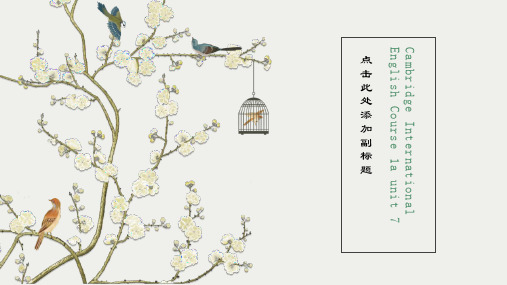
Listening exercises and answer analysis
• Multiple choice questions: These exercises require learners to choose the correct answer from multiple options, testing their understanding of the listening passage
• True/False exercises: Learners are asked to judge which statement is true or false based on the information provided in the listening passage This exercise helps them to understand the details of the listening material and check their comprehension accuracy
• Answer analysis: After completing the listening exercises, learners are guided to analyze their answers The analysis helps them identify their strengths and weaknesses in understanding the listening materials, providing them with feedback for further improvement
第二小节
Oral expression
Oral Skills Explanation
剑桥国际英语教程(入门级)7单元(全)

对话
• • • • Does it have a yard? 有院子吗 That sounds nice.听起来太棒了。 live alone.一个人住。 Do you have any sisters or brothers? 你有 兄弟姐妹吗? • that’s a big family.那是一个大家庭。 • own 自己的 my own bedroom.
口语基础E班 29-30教案 时间:11月8日19:10~21:00 授课老师:刘向
Unit 7 Does it have a view
1.学会常见房间设置以及家具的表达 2.使用There be 句型。
复习房间设置
• • • • • • • • 1.dining room 2.kitchen 3.living room undry room 5.bed room 6.bathroom 7.yard 8.hall • • • • • • • • 餐厅 厨房 起居室 洗衣间 卧室 浴室 院子 大厅
• 讲解Part7练习 • 讲解Part9练• there be 句型,“有”,表示“某时某地有某物”,它表 示客观存在,have,“有”,更加表示某人“拥有”的 意思。一定程度上,两者可以互相转换。P47 • there be 句型是日常生活中最常用的句型之一。它的句 型转换符合Be动词的所有规律。 • there is (not) =there are (not) • there is no +单数,表示否定,没有--• there are no +复数,表示否定,没有--• There’s no sofa in the bedroom.卧室里没有沙发 • There are no chairs in the living room.客厅里没有椅子
剑桥国际少儿英语一级Unit-7教学内容

Say it with Monty
practice
Listen to the story and act
Questions
Sing a song
Homework
1.单词5.5, 句子各三组,家 长签字。
2.听学生用书10分钟,家长签 字。
Unit7-3
Listen and sing the song
<Animals song>
Let’s review
Ask and answer
• Have you got long hair? Yes, I have. No, I haven’t.
Review
• They’ve got long tails. • They haven’t got hands.
Guess and say
• Have they got long noses? 他们有长鼻子吗?
Yes, they have. 是,他们有 No, they haven’t.不,他们没 有。
hippo
New lesson
giraffe
New lesson
tiger
New lesson
snake
New lesson
monkey
Practice
snake elephant giraffe crocodile hippo monkey tiger
பைடு நூலகம்
Practice
Production
Sing a song
剑桥国际少儿英语Unit7-Wild-animals

Presentation
tiger
Practice
Practice Open your Pupil’s Book , and turn to P40. • Listen, point and repeat.
Production : Name the Animals.
Look and Think!
long arms.
ahbaivgebegdortoom.
6.They
three pencils.
7.The cathave gotwt o small ears.
8.You
a nice house.
have got
Homework
1.Draw your favourite animal and give a name to it,then introduce it to your friends.
Presentation
hippo
Africa They are very tall. They’ve got a long neck. They’ve got long, thin legs.
They can eat leaves from tall trees. Have you ever seen it?
snake
Africa
They live in the jungle. They’re black and orange. They’ve got four legs and a long
tails. They can climb trees. They can run fast. They are very strong animals.
2.Tell people the importance of protecting animals.
剑桥英语Unit7
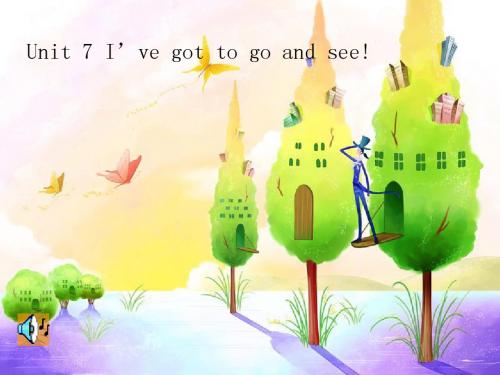
1.现在进行时态: 现在进行时态表示现在正在进行着某种事 情。 2.构成形式: 助动词“be+动词-ing”。动词-ing是动词 的分词形式,动词be要根据主语人称进 行 变化 。
3. 现在分词变化形式 a.直接在词尾加ing. 如:working,saying, watching b.重读闭音节双写最后一个字母加ing. 如:shopping ,running,getting
To make people happy. To make people laugh.To cheer people up
听力原文:
• It was a Friday afternoon. Bob invited his father’s best friend who is a famous clown to come to his class. • Many children heard this and came to see the clown. • The classroom was not big and there were not many chairs. So many children had to stand in the room and some children had to stay outside the classroom. • The clown said a few words and quickly took out a few balls and began to throw the balls up. He threw out the balls one by one and caught one after another with his two hands and threw them out again.
剑桥国际少儿英语KB3-Unit7-world-of-animals

long longer
big bigger
whale
bad worse good better
I’m walking, I’m walking. What can I see?... I can see a lion and it’s bigger than me.
♪♫
I’m hiding,
♫I’m hiding. What can I see?...
Dog
What color is it?
Look! What is it doing?
It’s big and strong. It can carry trees.
elephant
lion
It sleeps 20 hours a day.
bear
It likes to eat fish, fruit, plants and meat.
I can see a shark and it’s uglier than
than me.
me.
I’m standing, I’m standing. What can I see?... I can see a snake and it’s thinner than me.
♫
July 5th
I can see a bat and it’s smaller than me.
I’m swimming, I’m swimming. What can I see?...
I’m sitting,
♪ I’m sitting. What can I see?... I can see a monkey and it’s naughtier
5.Present the dialogue. 6. Learn the dialogue in detail.
剑桥国际英语第四册Unit7听力原文
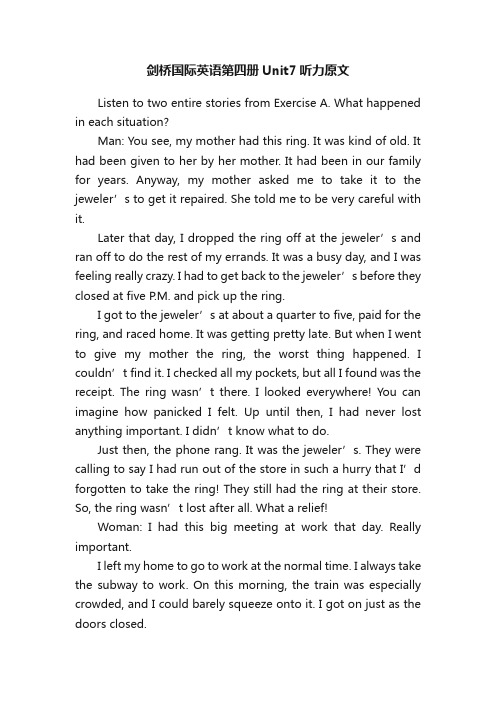
剑桥国际英语第四册Unit7听力原文Listen to two entire stories from Exercise A. What happened in each situation?Man: You see, my mother had this ring. It was kind of old. It had been given to her by her mother. It had been in our family for years. Anyway, my mother asked me to take it to the jeweler’s to get it repaired. She told me to be very careful with it.Later that day, I dropped the ring off at the jeweler’s and ran off to do the rest of my errands. It was a busy day, and I was feeling really crazy. I had to get back to the jeweler’s before they closed at five P.M. and pick up the ring.I got to the jeweler’s at about a quarter to five, paid for the ring, and raced home. It was getting pretty late. But when I went to give my mother the ring, the worst thing happened. I couldn’t find it. I checked all my pockets, but all I found was the receipt. The ring wasn’t there. I looked everywhere! You can imagine how panicked I felt. Up until then, I had never lost anything important. I didn’t know what to do.Just then, the phone rang. It was the jeweler’s. They were calling to say I had run out of the store in such a hurry that I’d forgotten to take the ring! They still had the ring at their store. So, th e ring wasn’t lost after all. What a relief!Woman: I had this big meeting at work that day. Really important.I left my home to go to work at the normal time. I always take the subway to work. On this morning, the train was especially crowded, and I could barely squeeze onto it. I got on just as the doors closed.Well, after a couple of minutes, I realized that my skirt had been caught in the subway doors. I could n’t pull it out! A man standing next to me tried to help me, but we still couldn’t get it. By this time, I was so embarrassed. Other people were staring at me. And my skirt was really stuck.Well, wouldn’t you know it, the doors to the subway opened on the other side for the next six or seven stations. I had to miss my stop. I just stood there, with my skirt stuck in the door, unable to move. Finally, the doors opened on my side. I was able to leave the train. Now I was really late.As soon as I arrived at work, my boss asked to speak to me.I know he would never believe why I was late. I felt so stupid! Of course, later we all laughed about it.Listen to actress Stella Hamptons talking about her life. What are some of her most embarrassing moments? Host: Hello, everyone, we’re talking to Stella Hamptons, famous Hollywood actress. Before the break, we were talking about your life, Stella, before you became a big star.Stella: Yes, … oh, but do we have to?Host: Well, I think it’s interesting. And I think our listeners will find it interesting, too. I mean, you didn’t become a big star overnight. You struggled for many years.Stella: You can say that again.Host: Tell us a little about it.Stella: Oh ,yes. I think I must have worked twenty or thirty different jobs.Host: Really?Stella: Sure! I couldn’t find work as an actress for many years, so I had to do something. You have to eat, right? Host: What kinds of jobs did you have?Stella: A little bit of everything; I worked as a waitress, in a department store, painting houses… I think I got fired from most of those jobs.Host: Oh, yeah? C’mon, tell us a few stories.Stella: This is so embarrassing… well, I remember I worked for a big department store in the hats department. It was so boring. We never had any customers during the day, and that’s when I worked. When I got sleepy, I used to lie down under the hat racks and take an occasional nap.Host: What happened?Stella: Well, one day I got caught- by my boss. And I got fired on the spot. Then there was the time I decided to paint houses. It turned out that I was allergic to the paint. And my body was so sore after working the first day, I could hardly get out of bed the next day. I couldn’t take the physical work. I got fired again.Host: Any other war stories?Stella: Well,…you’re not going to believe this, but I actually drove a taxi for a few days. I got hired as a cab driver. Host: No! You?Stella: Yes. I was desperate and thought I could make good tips. I needed the money at the time. Unfortunately, it didn’t last.Host: Fired?Stella: Yep. How did you guess? On my third day, I hit a pole. No one was hurt in the accident – my passenger was find – but it scared me to death. That was the end of my career as a driver.Host: Well, Stella, thanks for sharing those details with us. It’s a good thing you made it as an actress! After the commercial break, we’ll talk more with Stella about her new movie that’s being released in September.Listen to an early morning news broadcast. Write down the number of each type of news story you hear. Then take notes about what happened.Announcer: it’s seven o’clock and t ime for the news. Our top stories today:First, this from the World Health Organization, or the W-H-O. The W-H-O has reported that we are facing a potential global epidemic due to untreatable cases of tuberculosis, also known as TB. TB is dangerous because it affects the lungs. The number of cases is growing worldwide, and this has researchers worried. According to a study, a third of all known TB cases are untreatable. The drugs normally used to treat TB are simply not working. Researchers are trying hard to find out why this is the case. For now, the WHO is planning an international program to educate people about the dangers of TB.And now we have a report on the artist Vincent van Gogh. Of course, you may know that van Gogh is a famous nineteenth-century painter. You may also be familiar with one of his famous paintings: the one of flowers –sunflowers to be exact. It was painted in 1888 by van Gogh. Well, a scandal erupted in London yesterday over the authenticity of van Gogh’s Sunflowers. The painting was recently bought by a large multinational company for several million dollars. And now, an art expert is saying that the painting is a fake. Authorities are looking into the matter.Next, to Mexico. Hurricane Pauline pounded Acapulco and nearby areas last night, leaving many people homeless. The strong winds and heavy rains made for horrible conditions. Floods and landslides destroyed homes and cars, especially in the hillside areas. Rescue is particularly difficult because streets are blocked, in most cas es, by mud. It’s believed that some peoplemay be trapped inside their homes and cannot get out. Most people have left their homes and are now safely in temporary shelters. This natural disaster is going to have a big impact on the tourist business in Acapulco this year.Finally, a story for all you parents out there: How often do your kids push you to your limit, and what do you do about it? One tired and harassed mother form Illinois decided she’d had enough yesterday. Instead of yelling at her children, as she normally would, she decided to leave. She walked out the door and climbed a tree –the tree with her children’s tree house in it, that is. She decided to stay in the tree house until her three children stopped misbehaving. She told her children she had decided to stay in their tree house until they started appreciating her more. She put a sign in front of the tree house that said”on strike –No cooking, cleaning, doctoring, banking, or driving until demands met.”The children tried to persuade her to c ome down, but no luck. Finally, one of them had the smart idea of baking their mother’s favorite treat – brownies. Well, they must have smelled good because that did the trick. Mom agreed to come down and meet her children at the bargaining table. No word yet on the outcome of those negotiations, though. That’s it for now. We’ll be back in an hour with more news.。
剑桥国际英语入门级unit7 Does it have a view
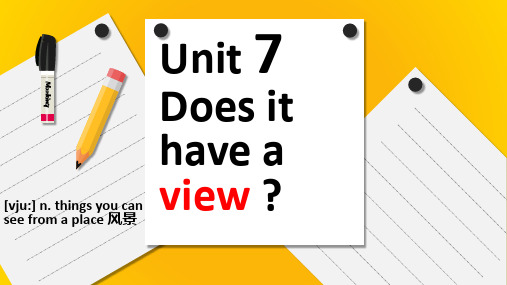
There is no =There isn’t any + chair 单数 There are no=There aren’t any + chairs 复数
There is no sofa in the living room. =There aren’t any sofas in the living room There is no chair. =There aren’t any chairs.
house(别墅):a building for people to live in, usually for one family
words
• lobby[ˈlɒbi] :大堂
1.Do you live in a house or a apartment? I live in ……
2.How many rooms are there in your house/ apartment? What are they?
Linda: __Does_____ it __have_____ a yard ?
Linda: Ten rooms! _Does__ it __have__ many
(有没有院子)
bedrooms?
Chris: Yes, it _does_____.
Chris: Yes, it _does____. It __have___ four.
3
4
2
1
Part4 Grammar focus
There is +可数名词单数/不可数名词 There are+可数名词复数
I don’t have a table in the bedroom. There’s no table in the bedroom.
剑桥国际英语Unit 7

4.
Host: Our question today is: How do you feel about the Internet? Call in and let us know! Here’s our first caller. What’s your name? Edward: It’s Edward. Host: Hi, Edward. How do you feel about the Internet? Edward: Well, I use it every day at work. It’s true that it makes my life easier. E-mail and
Ting: I’m Ting. Host: How do you feel about the Internet, Ting? Ting: Well, basically, I’m the outdoors type, and I’d much rather be kayaking or hiking than Web surfing. But, I’ll admit that the Internet is the best place to get the news, so I’ll go online for a couple of minutes a day.
Host: How do you feel about the Internet, Maria? Maria: Well, I don’t know how I’d live without it. I use at work, of course, but that’s only the beginning. As soon as I get home, I log on to my favorite chat room to talk to my friends. We’ve all got webcams set up so we can see each other too.
剑桥国际少儿英语Unit7课件 PPT

Listen and answer
• Who are talking? • What are they talking?(可用中文描述) • Who can sleep? Who can’t sleep?
Trevor! Pssst! Are you sleeping?
Yes, I am.
Trevor! Maskman! Can you be quiet, please? I’m trying to sleep!
What are they? They are lizards.
What are they? They are horses.
What are they? They are frogs.
What are they? They are spiders.
Listen and answer:
lizards. Do you like spiders, Simon? Simon: No, I don't. Stella: Oh. Well, there's a big, black, ugly spider in your
hair. Simon: Ahh!
剑桥国际少儿英语
(第2册)
Unit 7 At the farm
We can’t sleep now.
OK! Let’s talk about farms. Farm dogs can get sheep. Farm cats can catch mice. And we get milk from cows.
Yes, yes, I know… Maskman!
Marie: Trevor, can I have the sheep, please? Let's put it here, next to the cows.
(完整版)剑桥国际少儿英语-kb-2-Unit-7

I can’t sleep.
Well, count sheep, Maskman.
Who can’t sleep?
Maskman.
11, 12, 13…Oh, no! My sheep aren’t sleeping. They’re jumping! I can’t sleep.
We can’t sleep.
It is
Key structure
It’s got two big eyes.
has got It’s got two big legs.
has got It’s got two big eyes and legs.
Key structure
It’s got big eyes.
has got It’s got a long tail.
Guessing game
Can you guess?
It’s big. It’s got two big ears and a long nose. It’s got four big legs.
Guessing game It’s white. It’s got a yellow mouth. It can swim.
snakes birds
crocodiles giraffes
fish
lizards
tigers monkey
This is the Star zoo. The birds are next to the snakes. The fish are under the birds. The lizards are between the fish and the monkeys. The yellow and brown aniamals next to the monkeys are giraffes. The big orange and black cats under the crocodiles art tigers.
剑桥国际英语教程 Intro 第七单元 Unit 7

Reading If you travel to the USA, what do you want to do?
Brainstorming
Watch the video carefully
What does the video mainly talk about?
Prediction
/'wɪndoz/ they don’t No, ___________ _________________
Does ___________the house _________ a yard? have it does Yes, ___________ _________. it doesn’t No, ___________ _________________
1.表示现在的状态: e.g. He is twelve. She is at work. 2.表经常或习惯性的动作: e.g. I get up at 6:30 every day. He often goes to the English corner. 3.表主语具备的性格和能力等: e.g. She likes noodles. They speak French. 4.普遍真理和自然规律: e.g. Two plus four is six. The moon goes arounshe/it)+V.+其他? e.g. Does he study in a high school? Yes, he does. / No, he doesn’t. Does Lucy have a pet? Yes, she does. / No, she doesn’t.
实义动词(第三人称单数)的一般现在 时句式
剑桥国际英语教程unit-7

We had a great time !
• Are you very busy recently?
• What will you do if you two-day holiday?
Part 1
• Read a book • Watch TV • Spend time with family • Go fishing
• adj.西班牙的, 西班牙人的,
• n.西班牙语, 西班牙人
• His mother tongue is Spanish • 他的母语是西班牙语
Activities.
• what do you really want to do?
(shopping, go home, listen to music, have a
• Go surfing 冲浪 • Amazing /əˈmeɪ.zɪŋ/ adj.令人惊异的
A: look, he can lift that rock . B: Oh, that's amazing! 哦,真叫人惊异!
• Incredible [in'kredəbl]
• adj.难以置信的, 惊人的(好的方面)
称)
• Excellent [‘eksələnt] adj.杰 出的, 优秀的, 极好的
• an excellent meal • She speaks excellent English.
• Hawaii [hɑ:‘waii:] n. 夏威夷
• Fantastic [fæn'tæstik]
• adj.极好的, 巨大的,
time;
• Make the bed; some photocopies • take a day off; a trip; a vacation;
剑桥国际英语 Unit 7 We had a great time

2. They Read. Reading is a lifelong skill, and books help give you a greater understanding of the world around you.
3. They Take Classes. Education shouldn't stop at college, and shouldn't be rf you have a free hour and an Internet connection, you can start learning a new skill.
• How long was he there?
DISCUSSION
ON VACATION
Where did you spend your last vacation? How long were you away? Who were you with? What did you do there?
1. They Exercise. Physical exercise is important for both physical and mental health. Taking a half hour after work or on a weekend can give you a release after a day of stress. You’ll also build muscle and burn calories.
take
a vacation
DISCUSSION -- ANY QUESTIONS?
• I went …. on ** night. • Where did you go?
- 1、下载文档前请自行甄别文档内容的完整性,平台不提供额外的编辑、内容补充、找答案等附加服务。
- 2、"仅部分预览"的文档,不可在线预览部分如存在完整性等问题,可反馈申请退款(可完整预览的文档不适用该条件!)。
- 3、如文档侵犯您的权益,请联系客服反馈,我们会尽快为您处理(人工客服工作时间:9:00-18:30)。
• • • •
Do gardening Play sports Go to movies Spend time with friends
• Tell me the activities from your favorite to your least favorite.
Did you do anything special ?
• Did you do anything special?
• • • • • (Where, who, what time, how.) Where did you go? Who did you go with? What time did you go? How did you like it?
• Incredible [in'kredəbl]
• adj.难以置信的, 惊人的(好的方面)
• It's incredible.
• 令人难以置信/不可思议
• We had an incredible holiday!
• 我们度过了一个极愉快的假日. *
• She‘s an incredible businessman.
• adj.西班牙的, 西班牙人的,
• n.西班牙语, 西班牙人
• His mother tongue is Spanish • 他的母语是西班牙语
Activities.
• what do you really want to do? (shopping, go home, listen to music, have a blind date, go to a movie with sb, play sports) • Now suppose you really did the things want to do a few days( weeks, months) ago and did. • Share your happiness with your friends.
How was your vacation?
• Celia ['si:liə] n. 西莉亚(女子名) • Don [dɔn] n. 唐(人名, Donald的昵称)
• Excellent [‘eksələnt] adj.杰出的, 优秀的, 极好的
• an excellent meal • She speaks excellent English.
• 她游泳游得非常好.
• stic!
• 你测验及格了? 太棒了!
• Go surfing 冲浪 • Amazing /əˈme ɪ.zɪŋ/ adj.令人惊异的
A: look, he can lift that rock . B: Oh, that's amazing! 哦,真叫人惊异!
• 他是个了不起的生意人
On vacation
• Where do you really want to go? Suppose you went there a few days (weeks, months) ago. Now answer your friends questions.
• Where did you spend your last vacation? • How long were you away? • Who were you with? • What did you do there? • How was the weather? the food? • Do you want to go there again?
• Hawaii [hɑ:‘waii:] n. 夏威夷
• Fantastic
[fæ n'tæ stik] • adj.极好的, 巨大的,
• We watched a fantastic play yesterday evening.
• 昨天晚上我们看了一场非常精彩的演出
• She's a fantastic swimmer.
• Karaoke 卡拉OK
He likes to sing karaoke Go a karaoke bar Downtown 市中心 • I have an apartment in downtown .
• 我在市中心区有一套房子
• Spain [spein] 西班牙 • Spanish ['spæ niʃ]
Unit 7
We had a great time !
• Are you very busy recently?
• What will you do if you two-day
holiday?
Part 1
• • • • Read a book Watch TV Spend time with family Go fishing
• What do you do at home? • Where do want to do on the weekend? • Do the laundry ; the dishes • Go bowling; dancing; shopping • Have a party; a lot of fun; a good time; • Make the bed; some photocopies • take a day off; a trip; a vacation;
• Special [‘speʃəl] adj.特别的
• She is a special friend of mine. • 她是我一个特别的朋友 • I want to be special.
• Have a great/ good time • enjoy oneself.
• I had a great/ good time last night. • I enjoyed myself last night.
